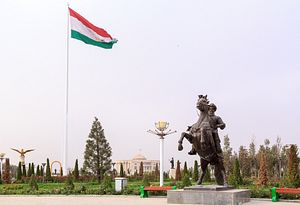The Islamic Renaissance Party of Tajikistan (IRPT), Central Asia’s only legally registered Islamist political party, is in its final days. This week the Prosecutor-General’s office released a statement saying that the IRPT is losing its status as a political party—pointing to the disappointing showing of IRPT candidates in the March parliamentary election (which were, as every election in the country has been, deeply problematic and judged unfair by Western observers) and the mass desertion of the party in several regions.
The Ministry of Justice appeared to push back, with Qurbonali Boboyev, the ministry’s head, telling Asia-Plus that “Neither the Prosecutor-General’s Office nor the Ministry of Justice has the right to ban any officially functioning political party.” But Boboyev did note that “the Supreme Court may ban a political party if it violates requirements of the country’s legislation.”
The IRPT, a fundamental part of the United Tajik Opposition (UTO) and its political heir challenged the government in Dushanbe during the five-year civil war, and was a key part of settling the eventual peace. The peace treaty assured the opposition that it would hold 30 percent of government posts, but over time the government of Emomali Rahmon has whittled away even that marginal amount of influence using a combination of dirty tricks to discredit the party publicly, intimidation to liquidate its ranks, and legalistic maneuvers to ultimately do away with it.
The March electoral failure was preceded by leaked sex tapes allegedly featuring IRPT members. After the election, state Imams called for the party’s disbandment, saying it was not needed to represent the country’s religious. The most interesting part of the government’s campaign against the IRPT has been its legal aspect: arbitrary arrests and adherence to “laws.”
Jamoliddin Mahmoudov, an IRPT member who was serving on the Central Elections Commission was arrested in mid-February, just over two weeks before the election, on charges nearly two decades old: that he had given another IRPT member two pistols in 1996. Asia-Plus reported this week that his trial was scheduled for July 8.
The case of Zaid Saidov, a businessman and politician who was arrested in 2013 on what observers called politically motivated charges–among them fraud and polygamy–and sentenced to 26 years in prison, is instructive for the IRPT. Saidov, who was not a member of the IRPT, was arrested shortly after declaring his intentions to form a new party and run for president. Asia-Plus reported recently that prosecutors are looking to add a 25-year sentence to his term, in relation to a new criminal case against him (being tried behind closed-doors, of course), featuring charges of forgery, abuse of office, embezzlement and tax evasion.
As self-exiled IRPT leader Muhiddin Kabiri predicted in an interview in late June, the government of Tajikistan is gearing up to use the law to shut the party down. He said the government would reduce the party’s numbers until it would not be able to operate in at least 50 percent of the country–setting it up for official dismantlement. Tajikistan will follow the letter of the law, while ignoring its spirit.
Writing for Registan, Helene Thibault conveyed an anecdote that supports the opinion of many that the desertion of the IRPT has been manufactured by the government. In her account, Firdaus (a pseudonym) was a party member from Khujand who recently denounced the party in a video posted to YouTube. He told Thibault that in June police arrived at his home with a warrant for his arrest. At the police station, they outlined the case against him–featuring men he did not recognize who were allegedly in custody for involvement in extremist activities and who had said Firdaus was their accomplice. Thibault says:
The police presented him with a case against him and threatened to prosecute him unless he agreed to make an official declaration to disavow his party. The “declaration” was videotaped and later put on Youtube, Facebook and other media. Firdaus was released in the evening but the police called him in once more the following day and threatened him again. Fearing he would be prosecuted and jailed, he fled to Russia few days later, where he remains until now.
Kabiri toyed with the idea of returning to Tajikistan to celebrate the peace–but clearly thought better of it and reportedly remains in exile in Turkey.
For nearly two decades, the IRPT, though increasingly marginalized, participated in Tajikistan’s politics as a form of loyal opposition, but their role in contributing to Tajik unity is being written out of history. Eurasianet reported that “Days before National Unity Day, state television aired a documentary about the civil war that focused almost entirely on how Rahmon … singlehandedly ended the conflict.”
Thibault’s conclusion, that “Islamic radicalism does not threaten stability in Tajikistan; it is rather the absence of legitimate channels to express discontent as well as the authorities’ failure to compromise,” that is the true source of danger, is similar to Thomas Ruttig’s 2013 conclusion that “What haunts Tajikistan in the current situation is less a threatening ‘Islamic factor’ than the authoritarian factor.”
































